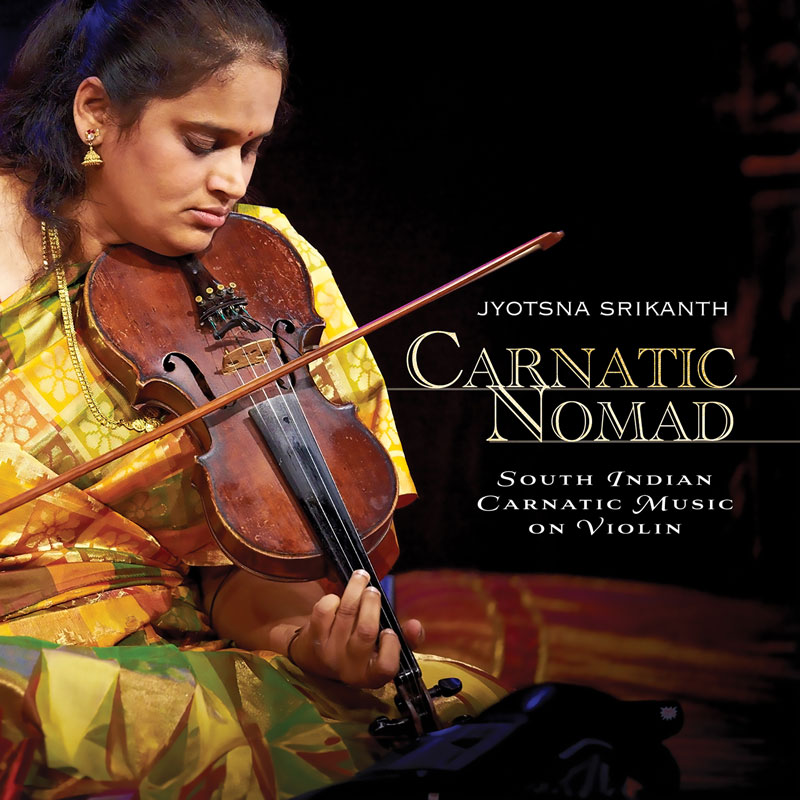Jyotsna Srikanth – Carnatic Nomad (Naxos World, 2024)
Jyotsna Srikanth is a distinguished British-Indian violinist devoted to advancing the presence of Carnatic (South Indian classical) music in the West. Carnatic Nomad, an album that traces its roots back to Srikanth’s extensive European tour over a decade ago, exemplifies her commitment to this endeavor. Over the course of six months, Srikanth performed in 15 countries, captivating audiences with the intricate aesthetics and technical nuances of the Carnatic tradition, as interpreted through her innovative approach to the Western violin.
In this album, Srikanth revisits select compositions from that transformative journey, accompanied by two eminent South Indian percussionists: Manjunath B.C. on mridangam and Amrit N. on khanjira. Together, they explore a spectrum of ragas, many originating from the Melakarta system, a foundational framework of 72 parent ragas from which numerous others are derived. The compositions are strategically arranged, adhering to the orthodox principles of Carnatic music, with some pieces introduced by an alapana (a non-rhythmic improvisation) and others followed by kalpana-swaras (improvisations within a rhythmic framework).
The album opens with “Vatapi,” a composition in the Hamsadhwani raga by Muthuswami Dikshitar, one of the revered ‘Trinity of Carnatic Music’ composers from the 18th century. This Sanskrit kriti, dedicated to Ganapathi of Vathapi, is beautifully performed in the eight-beat adi tala, analogous to the 4/4 time signature in Western music, and is followed by kalpana-swaras.
“Mamavasada Janani,” a piece by the 18th-century composer Swathi Thirunal, is set in the Kaanada raga, known for its sweet, melodious character. Srikanth’s splendid interpretation begins with an alapana, leading into a composition that venerates Devi, the Mother goddess representing Shakti (divine feminine energy). This piece is structured within the six-beat rupaka tala and concludes with kalpana-swaras.
“Manasa Sancharare,” a meditative work by 17th-century composer Sadashiva Brahmendra, is rendered in the Sama raga, known for its tranquil and serene qualities. Srikanth’s elegant rendition of this composition also employs the adi tala.
Another composition by Tyagaraja, also one of the ‘Trinity of Carnatic Music,’ “Ninnuvina” is presented in the Navarasa Kannada raga, which is derived from the 28th parent raga, Harikambhoji. This dazzling fast-paced piece, characterized by intricate swara patterns, is performed in the rupaka tala and concludes with kalpana-swaras.
The album continues with “Nagumomu,” another Tyagaraja composition, this time in the Abheri raga, which evolves from the 22nd Melakarta raga, Kharaharapriya. Srikanth brilliantly doubles the speed of the adi tala to create a 16-beat cycle, beginning with a detailed alapana followed by the main composition and concluding with kalpana-swaras and percussion solos. This remarkable 21-minute track exemplifies the enduring relevance of Carnatic music.
“Jagadhodhaarana,” a poignant composition by 16th-century composer Purandara Dasa, revered as the ‘Pitamaha’ (grandfather) of Carnatic music, is performed in the Kapi raga. This raga, often evoking sorrow or pathos, is rendered in the 16-beat adi tala.
The album concludes with “Tiruppugal,” a composition from the 15th-century collection of Tamil sacred songs by the poet-saint Arunagirinathar, dedicated to Lord Shiva’s son. Set in the Shanmukhapriya raga, the 56th raga of the Melakarta system, and the seven-beat mishra chapu tala, this rhythmically complex piece brings the album to an intricate and fitting close.
The album features Manjunath B.C. on mridangam; and Sri Amruth Nataraj (Amrit N.) on khanjira.
Manjunath B.C. (mridangam) is an acclaimed South Indian mridangam virtuoso who studied under Karnataka Kalashree K. N. Krishnamurthy and Sangeetha Kalanidhi Sri T. K. Murthy. He has performed with renowned artists across various genres and has composed with notable musicians such as Rafael Reina and Riccardo Nova. Skilled in Indian classical, world music, modern jazz, contemporary dance, and Indi-fusion, Manjunath has performed in over 60 countries at venues including the Queen Elizabeth Hall and the Sydney Opera House.
Sri Amruth Nataraj (Amrit N.) is among the few dedicated khanjira solo artists globally, known for his exceptional skill, technique, and versatility. His style blends speed, intricate patterns, and aesthetics, reflecting a deep mastery of the instrument. A disciple of the late khanjira legend Sri G. Harishankar Ji, Amrit is committed to preserving and promoting Indian percussion worldwide. He is also the youngest recipient of the A-top grade from All India Radio, awarded by the Government of India.
Buy Carnatic Nomad.



“Excellent and Beautiful” mrs Jyotsna Srikanth ji is very much capable of bringing
“Peace and Harmony” in heavily also mentally disturbed people in life, and cure their depressed “Mind and Brain” who are in search of” SHANTI “.
Namasthe maa. May God Bless You maa.